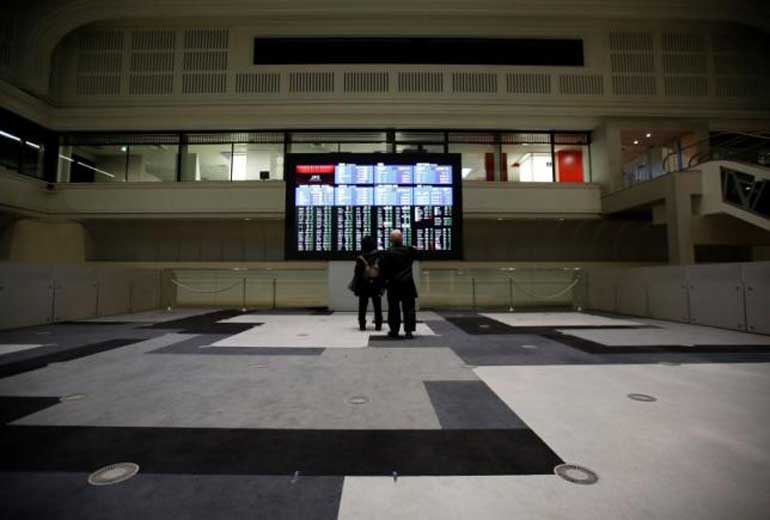Wednesday Feb 25, 2026
Wednesday Feb 25, 2026
Saturday, 20 February 2016 00:00 - - {{hitsCtrl.values.hits}}

Reuters: Asian shares slipped from near three-week highs on Friday as a rally in oil prices reversed and investors remained cautious about the outlook for the global economy.
Europe also looks set for a lacklustre start, with financial spreadbetters predicting Britain’s FTSE 100 and Germany’s DAX will open little changed.
MSCI’s broadest index of Asia-Pacific shares outside Japan fell 0.6%, but gains in previous sessions left it on track for a weekly gain of 4.1%.
Japan’s Nikkei dropped 1.4% as the yen firmed, but ended the week up 6.8%.
“This week is the first sign of change I have seen in 2016,” Evan Lucas, market strategist at trading services provider IG, wrote in a note, referring to some the upswing in equities.
But “most fund managers are nearing their maximum levels of cash under their respective mandates. This capital needs to be deployed to confirm the change is on.”
MSCI’s emerging market index hit a six-week high overnight on hopes that oil prices were stabilising, but the positive sentiment didn’t flow through to US shares.
The S&P 500 shed 0.5%, dragged down by lacklustre earnings from Wal-Mart Stores.
Oil prices reversed earlier gains on Thursday following a rise in US stockpiles but look set to post their first weekly rise in three weeks after the battered market took heart from a tentative deal by major producers to freeze output at January’s highs.
Still, doubts about how much other countries will cooperate have weighed on investors, with the focus squarely on Iran, which has pledged to increase output sharply to regain market share lost when sanctions were in place.
Brent crude extended losses on Friday, and was last trading down 0.9% at $ 33.99 per barrel, but is up 1.9% for the week.
US crude was at $ 30.53, off a two-week high of $ 31.98 hit on Thursday but up 3.7% so far this week.
“I would assume oil prices will face downward pressure and there will be selling into a rally,” said Daisuke Uno, chief strategist at Sumitomo Mitsui Bank.
In a sign that investor fears over a global economic slowdown are far from being on the wane, traditional safe-haven assets held firm after a strong outperformance on Thursday.
Gold surged 1.8% on Thursday to $1,230.90 per ounce and last stood at $ 1,226.56.
Investors also flocked to the safety of top-rated government bonds, with the 10-year US Treasuries yield falling back to 1.7294%, compared with Wednesday’s one-week high of 1.8470%.
In the currency market, the yen regained its edge, rising to 113.13 per dollar from this week’s low of 114.875.
The euro fell to as low as 125.34 yen on Friday, a low last seen in June 2013, and last traded at 125.83 yen.
Against the dollar, the common currency traded at $ 1.1124, having slipped to a two-week low of $ 1.1071 on Thursday.
The minutes from the European Central Bank’s January meeting showed some policymakers are advocating the need to act pre-emptively in the face of new threats on the economy.
A big focus is on the British pound and the EU summit in Brussels, where UK Prime Minister David Cameron is seeking more favourable terms for its EU membership.
A successful deal there is expected to lead to a referendum on EU membership as soon as in June.
“We expect a correction lower in EURGBP should an agreement be reached at the meeting, although an impasse, to which we assign a non-negligible probability, would likely weigh on the GBP,” wrote Barclays analysts in a report.
The pound stood at $ 1.4333, having fallen to a near seven-year low of $ 1.4080 last month partly on worries about so-called ‘Brexit’.
Against the euro, it stood at 77.625 pence per euro.